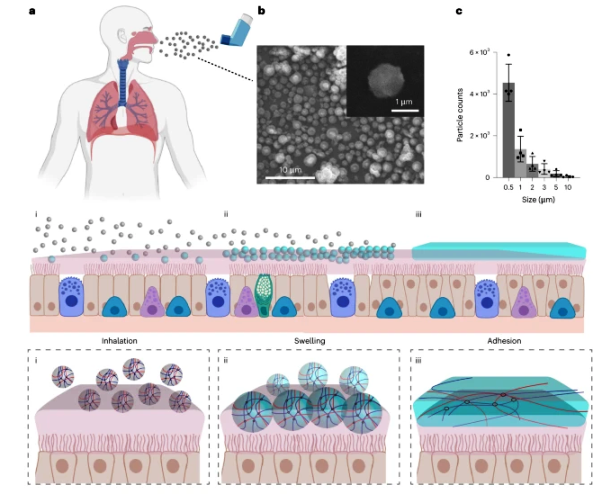An inhaled bioadhesive hydrogel to shield non-human primates from SARS-CoV-2 infection

Abstract
The surge of fast-spreading SARS-CoV-2 mutated variants highlights the need for fast, broad-spectrum strategies to counteract viral infections. In this work, we report a physical barrier against SARS-CoV-2 infection based on an inhalable bioadhesive hydrogel, named spherical hydrogel inhalation for enhanced lung defence (SHIELD). Conveniently delivered via a dry powder inhaler, SHIELD particles form a dense hydrogel network that coats the airway, enhancing the diffusional barrier properties and restricting virus penetration. SHIELD’s protective effect is first demonstrated in mice against two SARS-CoV-2 pseudo-viruses with different mutated spike proteins. Strikingly, in African green monkeys, a single SHIELD inhalation provides protection for up to 8?hours, efficiently reducing infection by the SARS-CoV-2 WA1 and B.1.617.2 (Delta) variants. Notably, SHIELD is made with food-grade materials and does not affect normal respiratory functions. This approach could offer additional protection to the population against SARS-CoV-2 and other respiratory pathogens.
Introduction
Since its emergence in late 2019, severe acute respiratory syndrome coronavirus 2 (SARS-CoV-2) has caused more than 600 million infections and more than 6.59 million deaths resulting from coronavirus disease 2019 (COVID-19) worldwide (as of 2 November 2022)1. Since viruses constantly change through mutation, several variants of the virus are currently variants of concern. The emergence of new variants, especially B.1.617.2 (Delta) and B.1.1.529 (Omicron), has driven new waves of sharp increases in COVID-19 cases all over the world. Vaccines, one of the effective strategies to protect people against infectious diseases by reducing morbidity and mortality, work primarily by producing neutralizing antibodies specific for the surface S protein. However, mutation of the S protein may possibly limit the efficiency of these vaccines. Thus, novel strategies that could effectively prevent infection by SARS-CoV-2, ideally before it even reaches the target lung cells, are desperately needed.
Spread through airborne transmission, SARS-CoV-2 must initially penetrate the mucus and enter the cells lining the respiratory tract. Possible reasons for the high transmissibility of SARS-CoV-2 include an active viral replication in airway epithelia at an early stage of infection. As the first and top layer of the immune system, physical barriers such as the mucus lining the airways play a key role in the defence against infections. The mucus barrier offers protection in two steps: first by trapping foreign pathogens and then by eliminating them through mucociliary clearance. Human airway mucus has played an important role in preventing many respiratory viruses from reaching target cells; however, impaired mucociliary clearance was found for SARS-CoV-2, which promotes viral spread in the respiratory tree and increases the risk of infections.
The interactions between mucus and bioadhesive polymers (such as chitosan) have been studied, opening possibilities for mucus engineering to block SARS-CoV-2 infection. Inspired by the protective mechanism of the mucus barrier and recent advances in high-performance bioadhesives, we designed and developed the SHIELD method to protect a subject against SARS-CoV-2. SHIELD particles are inhalable microspheres made from poly(acrylic acid) grafted with N-hydroxysuccinimide ester (PAAc-NHS ester) and gelatin. SHIELD particles interact with mucus to enhance its diffusional barrier properties, to reduce virus penetration.
For More information, please visit: https://nature.m7h.net/articles/s41563-023-01475-7
sources: Nature Materials, (2023)
Published: 09 February 2023
DOI: 10.1038/s41563-023-01475-7
Disclaimer:
Partial content of this page is transferred from the network, only for the use of scientific communication, if there is infringement, please contact us to delete. See the Privacy Policy for more information.